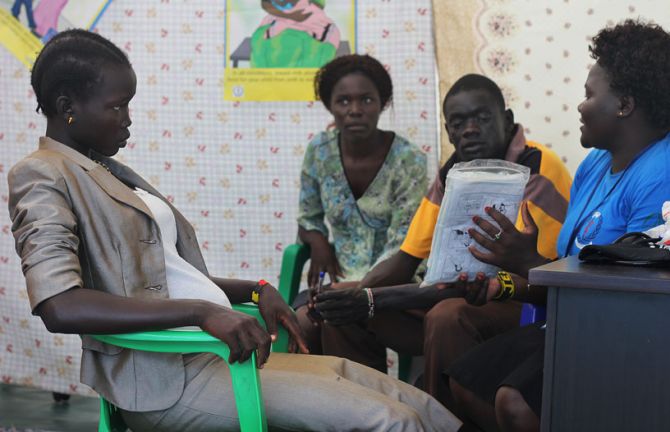

Feature Story
A long walk to an AIDS-free generation
15 December 2014
15 December 2014 15 December 2014When Angelina Twoki Terso arrived at the Juba Teaching Hospital’s antenatal clinic in 2004, when one month pregnant with her third child, she met with an HIV counsellor but didn’t think there was a need to get tested for HIV. Ms Twoki thought only people who smoked, drank and did things that she considered immoral contracted HIV.
Her first husband had died a few years before and she had never known the cause of his death. She remembers the counsellor telling her that anyone can contract HIV and she should consider getting tested, just to be sure. When the results came back a few hours later and she learned she was HIV-positive, Ms Twoki was in shock.
“I was going to commit suicide,” said Ms Twoki. “I wanted to run to the Nile. I was going to run there and jump in.” But the counsellor explained that she could get treatment at the hospital to keep her healthy and prevent the transmission of the virus to her baby.
She enrolled in the prevention of mother-to-child HIV transmission (PMTCT) programme and returned every month to the hospital for a check-up and to get her medication. She delivered her baby at the hospital and her daughter, Grace, who is now nine years old, is confirmed free of HIV.
Ever since Grace’s birth, Ms Twoki has dedicated her life to helping other women access and adhere to PMTCT services. She visits eight different antenatal clinics in South Sudan’s capital, Juba. “Every day I share my testimony. Most of the women are accepting testing for HIV because they want to know their status. They want to stay healthy for their family and they want to have a healthy baby. It’s very important,” said Ms Twoki.
The main problem, she said, is that there are not enough sites where PMTCT services are offered in South Sudan. She counsels women who have to walk more than 12 hours to reach Juba to access services and medicines. She says, despite her best efforts to convince them to stick with the programme, dozens drop out owing to the long distance. “They complain. They say they are tired of running here. The place is very far and they don’t have transport,” said Ms Twoki.
There are only 75 facilities scattered across South Sudan that have integrated PMTCT services. In 2013, an estimated 2600 children were infected with HIV through mother-to-child transmission, and only 2% of children living with HIV had access to life-saving treatment.
Martha Cayad-an, health specialist at UNICEF, stresses the need to scale up access to quality PMTCT services in South Sudan—especially in rural areas, where more than 75% of women live—and to embed such services in a broader range of health services.
“Rather than asking women to go to one place for an HIV test and to another for immunization, health centres must offer integrated services,” said Dr Cayad-an. “When it’s a one-stop shop, the facilities become more user-friendly for women and children and therefore they attract more clients.”
However, scaling up HIV services will require substantial improvements to the country’s health sector, which is plagued by too few sites, too few health workers and a general shortage of resources as a result of decades of war.
Emmanuel Lino, Deputy Director of HIV/AIDS Services at the Ministry of Health in South Sudan, said the government is committed to scaling up integrated maternal and child health-care services.
“Only 22 PMTCT sites in the country provide antiretroviral treatment, but we are hoping that once the resources are available, those stand-alone PMTCT services will eventually be integrated with long-term HIV prevention and treatment, tuberculosis and malaria services,” said Dr Lino.
Dr Lino acknowledges that it will take time, certainly more than what will satisfy the needs of women living with HIV and advocates such as Ms Twoki. But he said the country is trying to lay the foundation for a system that will not just reduce future infections among children but that provides the comprehensive services to keep the nation healthy.



